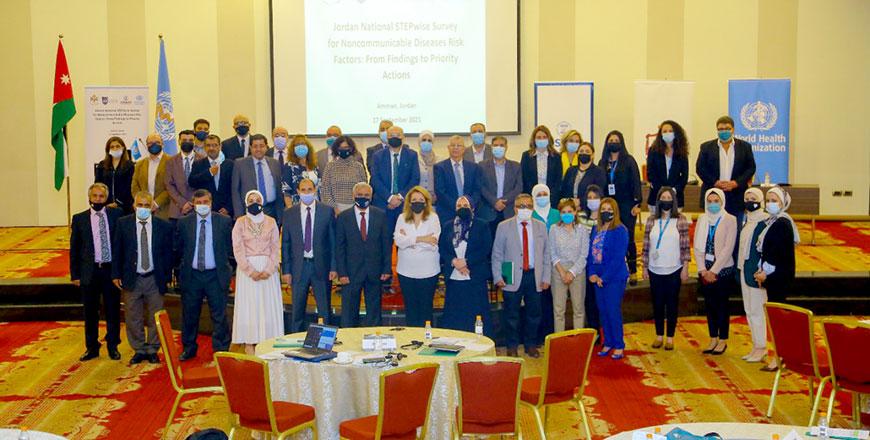You are here
Survey sheds light on non-communicable diseases in Jordan
By JT - Sep 27,2021 - Last updated at Sep 27,2021

Attendees pose for a photo at session to discuss the situation of non-communicable diseases (NCDs) in Jordan on Monday (Photo courtesy of WHO)
AMMAN — The Jordanian Ministry of Health, in collaboration with the World Health Organisation (WHO), on Monday held a session to discuss the situation of non-communicable diseases (NCDs) in Jordan, in light of the results of a recent national survey.
The survey monitors NCDs and their associated risk factors and was completed by the Health Ministry last year in cooperation with the Centre for Strategic Studies at the University of Jordan, with technical support from WHO and funding from the United States Agency for International Development (USAID), according to a statement sent to The Jordan Times.
The survey indicated the high prevalence of NCDs, primarily cardiovascular diseases, diabetes and mental health conditions, as well as their risk factors such as smoking, obesity, unhealthy diet and physical inactivity.
Health Minister Feras Al Hawari stressed the importance of preventing and combating NCDs through effective measures, primarily by developing a NCDs strategy and action plan with the involvement of main stakeholders.
This would strengthen the NCDs monitoring systems at all levels of health service providers, improve NCDs programmes at the primary healthcare level, and implement preventive interventions that promote a healthy lifestyle.
This would also reflect positively on reducing morbidity and mortality rates from NCDs in Jordan and pave the way for achieving the Sustainable Development Goals (SDGs) by 2030.
Jamela Al Raiby, acting WHO representative to Jordan, pointed to the increasing rates of morbidity and mortality due to NCDs and their associated risk factors globally and in Jordan.
She stressed the possibility of preventing NCDs and mitigating their impact on public health through active involvement of all sectors and an integrated governmental and societal approach.
"It is very important to translate the results and recommendations of the latest national Stepwise survey into actionable interventions in line with updated scientific evidence and approved health standards," she said.
John Mckay, USAID Public Health Office Director, said: "USAID is proud to support the Health Ministry to promote healthy lifestyles and public health.”
"NCDs are risk factors for COVID-19, which highlights the need for a preventive approach that cannot be addressed unless accurate data of the risk factors are available," McKay added.
Zaid Eyadat, Vice President of International Affairs, Quality and Accreditation at the University of Jordan and Director of the Centre for Strategic Studies, pointed out the importance of joint cooperation between research centres, government institutions and international organisations in the fields of health research.
The session included discussions to identify national strategic interventions for reducing NCDs in line with the four areas stipulated in the regional framework for action to implement the United Nations Political Declaration on the Prevention and Control of NCDs, which Jordan is committed to achieving. These four areas are governance, prevention and reduction of risk factors, healthcare and surveillance, and monitoring and evaluation.
Related Articles
AMMAN — The Ministry of Health, the Royal Health Awareness Society and the World Diabetes Foundation organised a two-day conference under th
AMMAN — Ninety-eight per cent of Jordanians believe that creating green spaces and increasing access to healthcare services will help reduce
AMMAN — The 2019 Jordan survey for Non-Communicable Disease risk factor surveillance (STEPS-wise) was launched on Sunday to support Jordan's
















